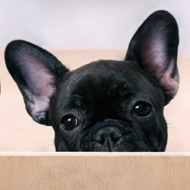
Suspicions raised by foreign microchips
A third of vets who treat small animals have seen puppies they suspect to be illegal imports, according to new figures.
Sixty-nine per cent of vets who responded to the BVA’s Voice of the Veterinary Profession survey said their suspicions had been raised by foreign microchips and the puppy’s age not matching the date in its passport.
Some vets also cited the puppy’s health as a problem after seeing cases of kennel cough and parvovirus.
The most common breeds vets presumed to have been illegally imported were those used in advertising or made popular by celebrities. Half of vets raised concerns about illegal imports of French bulldog puppies, with pugs (29%) and chihuahuas (16%) coming in as the second most common.
“Illegal importers only care about profit, not puppy welfare. As vets, we’ve heard awful stories of people buying puppies only for their puppy to be dead 24 hours later because of the way it was bred and cared for in its early days outside of the UK,” commented Gudrun Ravetz, president of the BVA.
“It’s extremely concerning that we’re seeing so many flat-faced breeds, like French bulldogs, being brought into the country given the serious breathing and health issues that they already suffer from, let alone the added disease risks associated with illegal imports.”
To prevent illegal profiteering practices and ensure the purchase of a healthy puppy, the BVA is advising anyone considering buying a dog to conduct their research and wait until the New Year.
“It’s a life-changing commitment and we'd advise anyone thinking about getting a dog to speak to their local vet first and use helpful tools like the online ‘Puppy Contract’ to make sure they buy a happy, healthy puppy,” Ms Ravetz added.
More than 1,000 veterinary surgeons and veterinary students took part in BVA’s Voice of the Veterinary Profession bi-annual survey.
The survey captures the professions’ views and experiences by asking questions about animal health and welfare, public health and trends in the veterinary profession.



 The Veterinary Medicines Directorate (VMD) is inviting applications from veterinary students to attend a one-week extramural studies (EMS) placement in July 2026.
The Veterinary Medicines Directorate (VMD) is inviting applications from veterinary students to attend a one-week extramural studies (EMS) placement in July 2026.